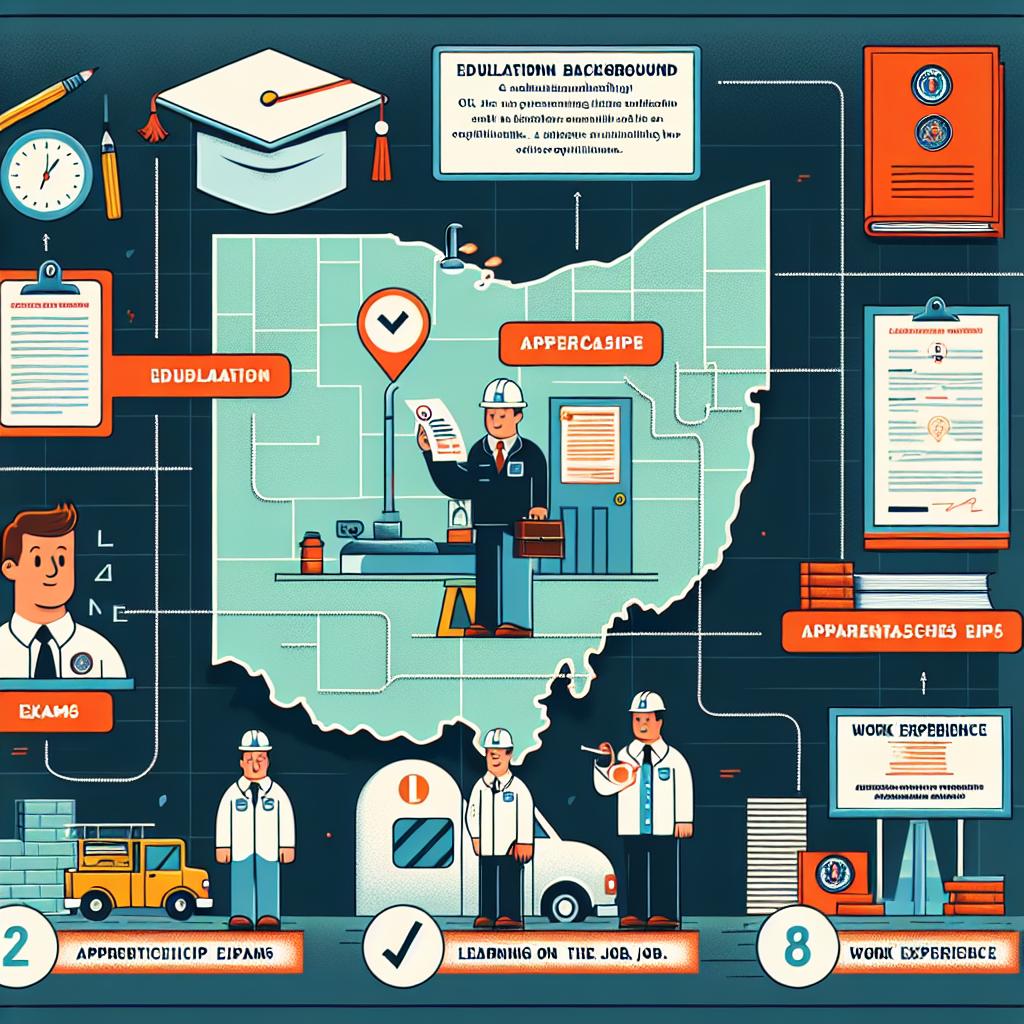A Breath of Fresh Air: Navigating the Path to an HVAC License in Ohio
In the heart of the Midwest, Ohio experiences an array of seasonal shifts, where sweltering summers give way to frigid winters. As residents rely heavily on heating, ventilation, and air conditioning (HVAC) systems to maintain comfort in their homes and businesses year-round, the need for skilled HVAC professionals continues to grow. If you’re considering stepping into this rewarding field, obtaining an HVAC license in Ohio is the first crucial step on your journey. This article will guide you through the essential requirements and processes involved, empowering you to transform your passion for climate control into a fulfilling career. Whether you’re a seasoned technician or a newcomer eager to learn, understanding the licensing landscape in Ohio will set you on a path to success in this vital industry.
Understanding the HVAC Licensing Requirements in Ohio
Obtaining an HVAC license in Ohio is a crucial step for anyone looking to establish a career in this highly specialized field. The state requires aspiring professionals to meet certain criteria and complete specific steps to ensure they are equipped with the necessary skills and knowledge. Key requirements include:
- Age Requirement: You must be at least 18 years old.
- Educational Background: A high school diploma or equivalent is typically required.
- Experience: Generally, you need to complete an apprenticeship or have relevant work experience in HVAC.
- Examinations: Passing the required exams is essential for licensure.
Understanding the types of HVAC licenses available in Ohio can also guide you on your path. Ohio offers several categories, including Residential, Commercial, and a Master HVAC license. Each license has its own set of requirements, fees, and renewal processes. Below is a brief overview of some common licenses:
| License Type | Requirements | Renewal Period |
|---|---|---|
| Residential HVAC License | Exams & Experience | Every 3 years |
| Commercial HVAC License | Exams & Experience | Every 3 years |
| Master HVAC License | Advanced Exams & Experience | Every 3 years |

Navigating the Educational Pathways for HVAC Training
Embarking on a career in HVAC in Ohio requires a clear understanding of the educational pathways available to you. Starting with a high school diploma or GED is essential, followed by pursuing formal training through an accredited technical school or community college. Many institutions offer specialized programs that cover key aspects of heating, ventilation, and air conditioning systems. These programs typically include both classroom instruction and hands-on training, providing a well-rounded foundation necessary for entering the field. Key areas of focus often include:
- Fundamentals of HVAC systems
- Electrical theory and circuitry
- Refrigeration cycle and components
- Installation and maintenance practices
- Safety procedures and best practices
After completing your education, obtaining practical experience through apprenticeships or on-the-job training is crucial. Engaging with experienced HVAC professionals allows you to gain insight into real-world applications and troubleshooting techniques. Once adequately trained, aspiring HVAC technicians must pass state examinations to secure their licenses. The requirements for licensure can vary, but generally, candidates must complete an application, provide proof of experience, and pass a certification exam. Here’s a simplified overview of the steps:
| Step | Description |
|---|---|
| 1. Complete Education | Finish HVAC training program |
| 2. Gain Experience | Participate in apprenticeships |
| 3. Apply for License | Submit application and fees |
| 4. Pass Exam | Take and pass the HVAC licensing exam |

Gaining Practical Experience Through Apprenticeships
One of the most effective pathways to acquire your HVAC license in Ohio is through apprenticeships. These programs offer a unique opportunity to immerse yourself in hands-on training while working alongside seasoned professionals in the field. By participating in an apprenticeship, you will not only gain valuable technical skills but also develop a comprehensive understanding of industry standards, safety practices, and customer service essentials. Alongside classroom instruction, apprenticeships often include a minimum number of hours working in the field, allowing you to apply theoretical knowledge in real-world scenarios.
When seeking an apprenticeship in Ohio, consider the following steps to enhance your chances of success:
- Research Local Programs: Look for HVAC apprenticeship programs offered by trade schools, unions, or HVAC contractor associations.
- Meet Basic Requirements: Ensure you possess the necessary prerequisites, which may include a high school diploma or equivalent.
- Gain Soft Skills: Develop interpersonal abilities like communication and teamwork, which are critical in the HVAC industry.
- Prepare for Interviews: Be ready to demonstrate your enthusiasm and commitment to learning, as interviewers often prioritize candidates who show passion for the trade.
| Apprenticeship Provider | Key Features |
|---|---|
| Local Trade School | Structured program with classroom instruction and hands-on training. |
| Union Apprenticeship | Benefits and networking opportunities with experienced professionals. |
| HVAC Contractors | On-the-job training with potential job placements upon completion. |

Completing the Application Process for Your HVAC License
Once you’ve completed your training and gained the necessary experience, it’s time to submit your application for an HVAC license in Ohio. The first step in this process is to gather all required documentation. This typically includes proof of your education, letters of recommendation from industry professionals, and evidence of any apprenticeships you may have completed. Ensure your documents are organized to facilitate a smooth application process. Here are the essential items you might need:
- Completion certificates from your HVAC training program
- Apprenticeship documentation
- Proof of employment and endorsements
- Government-issued identification
After assembling your application package, you’ll need to submit it to the Ohio State Board of Building Standards. Make sure to pay the required application fee and confirm any additional state requirements. Approval can take some time, so patience is crucial. During this waiting period, you might consider preparing for the licensing examination. Typically, the test will cover essential topics, including:
| Topic | Description |
|---|---|
| Refrigeration | Understanding cooling systems and refrigerants. |
| Heating Systems | Knowledge of boilers, furnaces, and heat pumps. |
| Ventilation | Principles of air distribution and duct systems. |
| Electrical Systems | Wiring and safety practices related to HVAC. |
Q&A
Sure! Here’s a Q&A section for an article about how to get an HVAC license in Ohio.
Q&A: How to Obtain an HVAC License in Ohio
Q: What does HVAC stand for, and why is it important to have a license in this field?
A: HVAC stands for Heating, Ventilation, and Air Conditioning. It’s important to have a license in this field because it ensures that technicians possess the necessary skills and knowledge to perform installations, repairs, and maintenance safely and efficiently. A license also protects both the technician and the consumer, ensuring adherence to industry standards and building codes.
Q: What are the basic requirements to apply for an HVAC license in Ohio?
A: To apply for an HVAC license in Ohio, you need to be at least 18 years old, hold a high school diploma or equivalent, and have completed an HVAC training program. Additionally, you must gain practical experience through an apprenticeship or work in the field for a specified period, which usually ranges from two to five years.
Q: Are there any specific educational programs I should consider before applying for a license?
A: Yes, aspiring HVAC technicians should consider enrolling in an accredited vocational or technical school program that offers comprehensive training in HVAC systems. These programs typically cover areas such as thermodynamics, refrigeration theory, electrical systems, and troubleshooting techniques. Some schools even offer courses that help prepare students for the licensing exam.
Q: What type of examination will I need to pass to obtain my HVAC license?
A: In Ohio, applicants must pass the Ohio HVAC examination, which tests knowledge on various topics, including system design, installation, maintenance, and safety practices. This examination consists of both technical and practical components, assessing both theoretical understanding and hands-on skills.
Q: Is there a specific licensing board or authority I need to apply to for my HVAC license?
A: Yes, in Ohio, you will need to apply to the Ohio Construction Industry Licensing Board (OCILB). This board oversees all licensing for HVAC contractors and technicians. It’s essential to follow their specific application procedures and provide all required documentation during the licensing process.
Q: How long does the licensing process usually take?
A: The licensing process can take anywhere from a few weeks to several months, depending on factors such as your readiness for the examination and the processing times of the OCILB. It’s a good idea to start your preparations early and allow ample time for completion of all requirements before applying for your license.
Q: What should I do once I receive my HVAC license?
A: Once you receive your HVAC license, you can start offering your services as a licensed technician! However, it’s important to stay current on industry trends, safety guidelines, and continuing education requirements to maintain your license. Many states, including Ohio, require licensed HVAC professionals to complete renewal courses periodically.
Q: Are there any resources or organizations that can help me during the licensing process?
A: Absolutely! Many local trade organizations, such as the Air Conditioning Contractors of America (ACCA) and the Refrigeration Service Engineers Society (RSES), provide valuable resources, training opportunities, and support for HVAC professionals. Additionally, networking with experienced technicians can provide insights and advice along your licensing journey.
With this Q&A, you’ve got a comprehensive guide to the vital steps needed to obtain your HVAC license in Ohio. Take your first step today and embark on a rewarding career in this essential field!
In Summary
obtaining an HVAC license in Ohio is a significant step toward a rewarding career in a vital industry. By understanding the requirements, completing the necessary training and experience, and navigating the examination process, you can position yourself for success in the heating, ventilation, and air conditioning field. Remember, this journey not only enhances your professional skills but also contributes to the comfort and safety of countless homes and businesses across the state. As you embark on this path, stay informed, keep learning, and embrace the opportunities that come your way. With dedication and perseverance, the rewards of becoming a licensed HVAC technician in Ohio are well within your reach.

